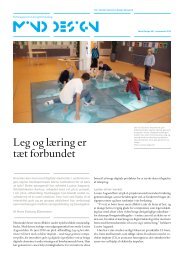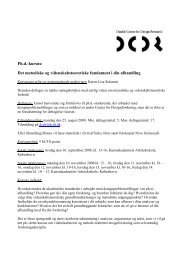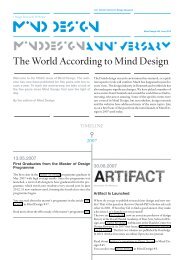Play-Persona: Modeling Player Behaviour in Computer Games
Play-Persona: Modeling Player Behaviour in Computer Games
Play-Persona: Modeling Player Behaviour in Computer Games
You also want an ePaper? Increase the reach of your titles
YUMPU automatically turns print PDFs into web optimized ePapers that Google loves.
esearch that dealt with categoriz<strong>in</strong>g people starts already with a limited sample: expert MUD users<br />
or MMORPG players. One of the few game-oriented typology systems that seem to adopt a much<br />
broader framework is International Hobo’s Demographic Game Design [5]. Us<strong>in</strong>g the widely<br />
supported Myers-Briggs Type Indicator, it truly widens the potential types to the whole mass<br />
market. International Hobo’s next step has been the translation of the MBTI <strong>in</strong>to a more relevant<br />
audience model shr<strong>in</strong>k<strong>in</strong>g the 16 types <strong>in</strong>to 4 types: Conquerors, Managers, Wanderers and<br />
Participants. As Bateman po<strong>in</strong>ts out this is not the only way the patterns could have been<br />
reordered: accord<strong>in</strong>g to the perspective adopted they could have been grouped focus<strong>in</strong>g on play<br />
style or skills <strong>in</strong>stead of motivations.<br />
The methodology I propose for this paper is open, deductive, top-bottom: <strong>in</strong>stead of start<strong>in</strong>g with<br />
empirical evidence I have combed what Maslow called “the four forces of psychology” [17] look<strong>in</strong>g<br />
for a theory of personality that can best accommodate for the dynamic aspects of the emotional,<br />
rational and behavioural patterns that contribute creat<strong>in</strong>g the personality compound.<br />
This change <strong>in</strong> the approach is not meant to deny the value of empirical methods; on the contrary,<br />
it is my <strong>in</strong>tention to capitalize on decades of cognitive and personality studies and back up <strong>in</strong>ductive<br />
studies with evidence com<strong>in</strong>g from psychology research conducted on man, the self and<br />
behaviours. Subsequently I will try to evaluate whether any of their f<strong>in</strong>d<strong>in</strong>gs can be applied to study<br />
player’s behaviour <strong>in</strong> a game environment: towards a theory of the player.<br />
4.1 Humanistic psychology<br />
It was co-founded <strong>in</strong> the 1950s by Abraham Maslow as a reaction to the previous two forces:<br />
psychoanalysis and behaviorism. Its focus from the beg<strong>in</strong>n<strong>in</strong>g has been man as a whole and not<br />
just his pathologies; subjective experiences of persons have been preferred to forced, def<strong>in</strong>itive<br />
factors that determ<strong>in</strong>e behaviour. Free will and self-determ<strong>in</strong>ation were its key concepts. Maslow<br />
was <strong>in</strong>itially <strong>in</strong>terested <strong>in</strong> motivation: he noticed how people seemed to be motivated by the same<br />
universal needs even though they f<strong>in</strong>d very different strategies and behaviours to gratify them.<br />
Accord<strong>in</strong>g to Maslow "ends <strong>in</strong> themselves are far more universal than the roads taken to achieve<br />
those ends, for these roads are determ<strong>in</strong>ed locally <strong>in</strong> the specific culture. Human be<strong>in</strong>gs are more<br />
alike than one would th<strong>in</strong>k at first" [22].<br />
Maslow <strong>in</strong>dividuated five basic, universal needs: bio/physiological needs, safety needs, social needs,<br />
ego needs, and the needs to f<strong>in</strong>d a purpose and actualize the self. In l<strong>in</strong>e with the premises set<br />
forth by humanistic psychology he transcended the shortcom<strong>in</strong>gs of both psychoanalysis and<br />
76















